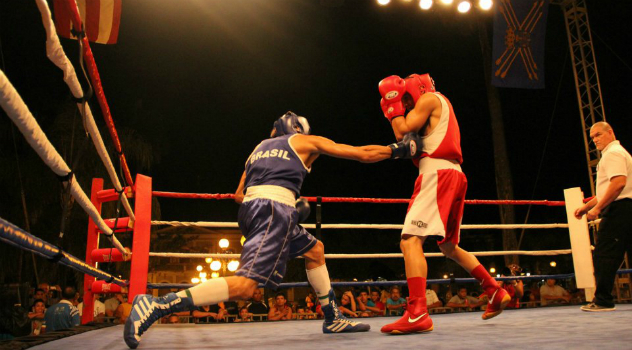Boxing

History
There is evidence that boxing was practiced as far back as 3,000 BC in Egypt. But it was in Ancient Greece, in the 7th century BC that it began to look like a sport. However, boxing history is full of highs and lows. Despite being part of the Olympics in Ancient Greece, when fighters used bits of leather to protect their hands, boxing actually fizzed out.
During the Roman Empire, controversial changes were made to the sport. Boxing began being practiced by gladiators, who wore gloves filled with metal. Indeed, this was suited to the purpose of the fights, as most of the times combat ended with the death of one of the fighters.
With the end of the Empire, boxing went into hibernation for a long time. It reappeared again in the 17th century in England. In 1880, amateur competitions of the sport started to be organised in the bantamweight (up to 54kg), featherweight (up to 57kg), lightweight (up to 63.5kg), middleweight (up to 73kg) and heavyweight (any weight).
Boxing made its debut in the Olympics at the St. Louis Games in 1904. Since then, it has undergone some important changes, such as the introduction of head guards, which started at the Los Angeles Games in 1984; the introduction of an electronic scoring system at the Barcelona Games in 1992; and the way the scoring changed for the Beijing Games in 2008. Another significant change took place in the last edition of the Games in London 2012: three female boxing events were included in the Olympics (flyweight, under 51kg, lightweight, under 60kg and middleweight, up to 75kg).
For the Olympics in Rio de Janeiro, the International Boxing Association (AIBA) has developed a new system to allow professional fighters to take part in the Games for the first time. However, this does not mean that names such as Floyd Mayweather will not be in Rio, as some criteria need to be met, like taking active part in APB (AIBA Pro Boxing), which is the association's professional league. In addition, other rules will be changed, for example, fighters will have to wear head guards and t-shirts.
The events
 In the last edition of the Games last year in London, men competed in ten events and women in three.
In the last edition of the Games last year in London, men competed in ten events and women in three.
Men
Light flyweight (up to 49kg)
Flyweight (up to 52 kg)
Bantamweight (up to 56kg)
Lightweight (up to 60kg)
Light welterweight (up to 64kg)
Welterweight (up to 69kg)
Middleweight (up to 75kg)
Light heavyweight (up to 81kg)
Heavyweight (up to 91kg)
Super heavyweight (over 91kg)
Women
Flyweight (up to 51 kg)
Lightweight (up to 60kg)
Middleweight (up to 75kg)
Curiosities
Before the fame
At the age of 18, a young American boxer arrived at the 1968 Games in Rome with a dream he wanted to fulfil: win the gold medal in the light heavyweight event. His name was Cassius Marcellus Clay. Later, Clay changed his name to Muhammad Ali and became the greatest boxer in history.
In that year in Italy, Clay was not yet a known name in the sport. However, he already showed the talent that would lift him to the level of a legend. In order to win the gold, he beat Yan Becaus from Belgium – 1956 Olympic champion -, had to get through Gennady Shatkov from the Soviet Union, followed by Anthony Madigan from Australia and then, Polish fighter Zbigniew Pietrzykowski.
Thirty-six years after winning the gold medal and known the world over as Ali, he lit the Olympic flame at the Atlanta Games in 1996. He was also given a gold medal by the IOC to symbolise his 1968 win.
Unexpected victory
The Seoul Olympics in 1988 saw one of the most curious boxing stories, which led to a change in the way the fights were scored. Three judges seemed to want to avoid the embarrassing defeat of a South Korean boxer and ended up giving him the gold medal.
The final between Park Si Hun and Roy Jones Jr. from the USA in the light welterweight event was not at all a balanced fight. Jones' superiority was so evident that three out of the five judges had the same idea: award victory to the South Korean and thus, avoid an embarrassing 5-0 defeat by the home athlete. The result was that Park ended up with the gold medal and the American won the silver.
After the result was announced, the South Korean athlete, who was embarrassed, lifted Jones Jr.'s arm acknowledging his victory. The curious episode led the International Boxing Association (AIBA) to review the scoring system, which from 1989, began being recorded automatically during the fight, as the fighters get their blows in.

